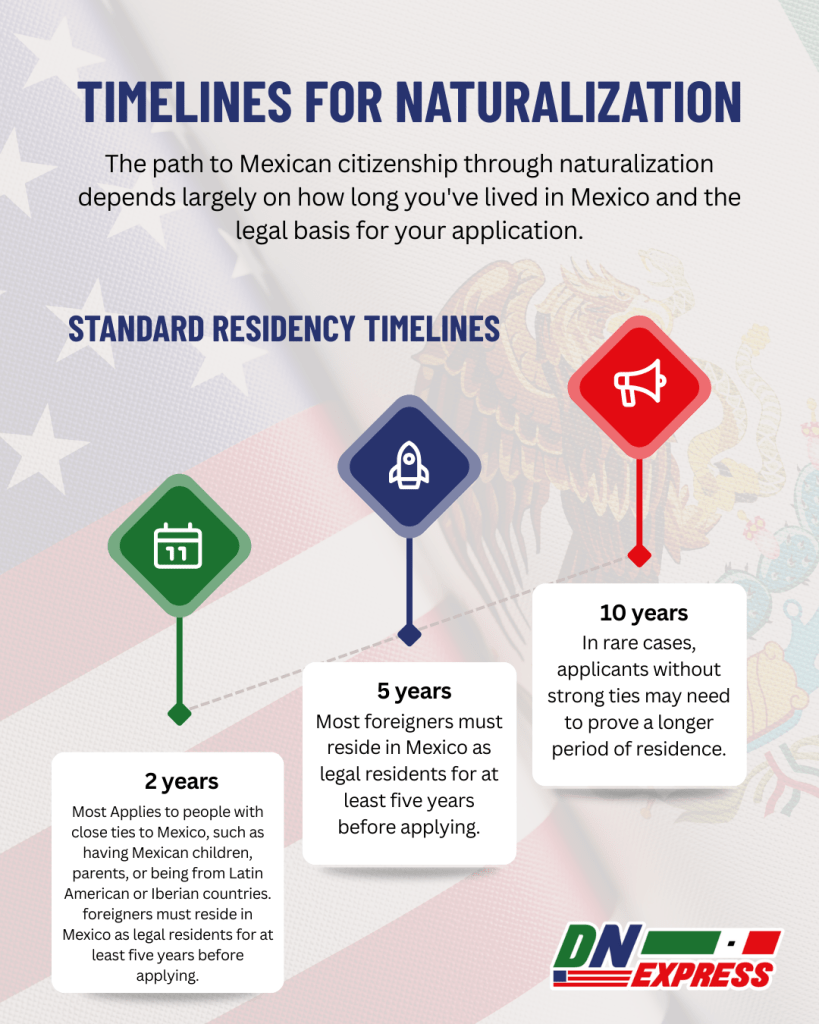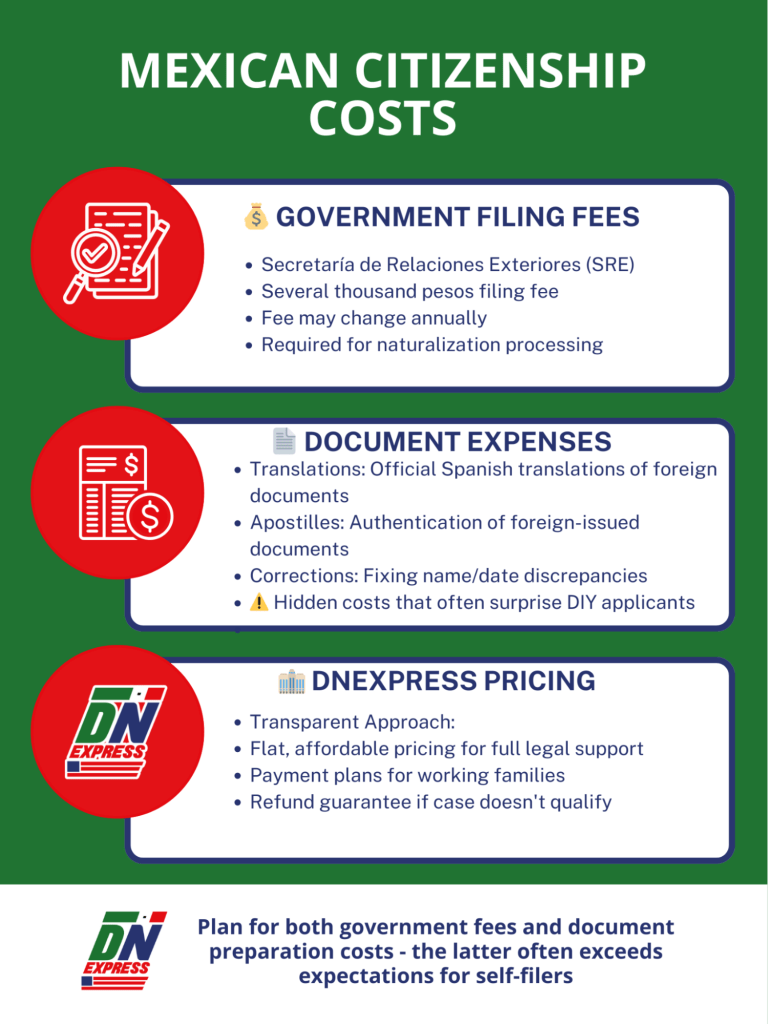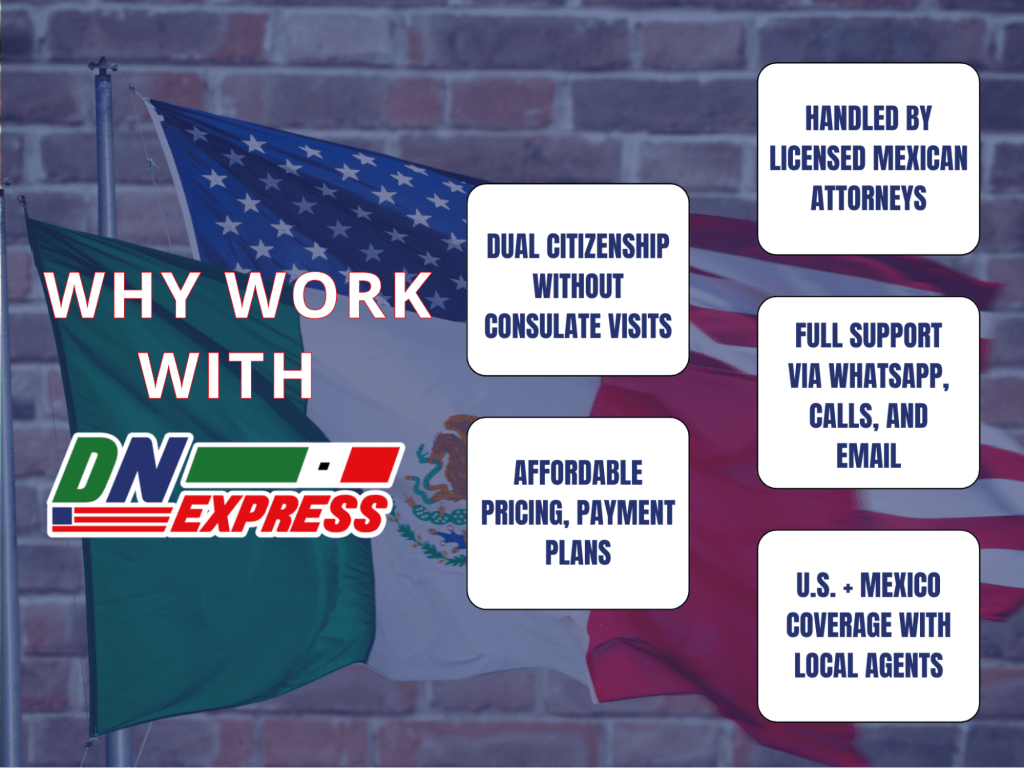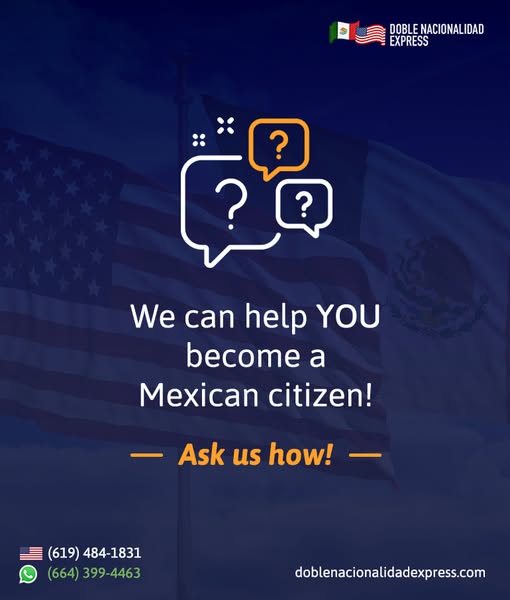
Becoming a Mexican citizen through naturalization can feel overwhelming. Between paperwork, deadlines, and confusing consulate rules, many people give up before they even start.
But here's the truth: citizenship through naturalization is your legal pathway to recognition, rights, and opportunities in Mexico.
Whether you're the child of Mexican parents born abroad, a spouse, or a long-term resident, you have a right to explore this option. It's simpler than you think when handled correctly.
We attend clients every day who believed naturalization was “too complicated” or “impossible without the consulate.” In reality, there are clear, legal processes for people in different situations.
The key is knowing which path applies to you and how to avoid mistakes that can delay your case.
In this guide, you'll learn not only what naturalization means, but how it works depending on your family history, residency, or personal circumstances. Additionally, you'll understand why taking action now could open doors to travel, property ownership, and generational security for your family.
What Does Citizenship Through Naturalization Mean?
Naturalization is the legal process by which a foreigner, or someone with family ties to a country, becomes a full citizen after meeting specific requirements such as residency, marriage, or cultural integration.
Unlike a temporary visa or residency card, naturalization grants you the same permanent rights as any other citizen.
Citizenship by birthright is automatic. You are a citizen if you were born in Mexico or to Mexican parents, no matter where you were born.
Citizenship through naturalization, on the other hand, must be earned or reclaimed through an application process, proving your eligibility under Mexican law.
Why does this distinction matter? Because a naturalized citizen does not represent a “second-class” citizen.
Once granted, you gain the same rights as a Mexican by birth:
- A Mexican passport, one of the most travel-friendly in Latin America
- The right to vote and fully participate in Mexico's democracy
- Legal protections in both Mexico and abroad as a recognized national
- The ability to pass citizenship on to your children, securing their future

Requirements & Timelines for Naturalization
The path to Mexican citizenship through naturalization depends largely on how long you've lived in Mexico and the legal basis for your application.
While requirements vary, most applicants must show proof of residency, demonstrate integration into Mexican society, and meet legal criteria such as good conduct and self-sufficiency.
El Secretaría de Relaciones Exteriores (SRE) manages the naturalization process in Mexico.
Standard Residency Timelines
- 5 years: Most foreigners must reside in Mexico as legal residents for at least five years before applying.
- 2 years: Applies to people with close ties to Mexico, such as having Mexican children, parents, or being from Latin American or Iberian countries.
- 10 años: In rare cases, applicants without strong ties may need to prove a longer period of residence.
Language, Culture & Integration Tests
Applicants must show they can communicate in Spanish and have a basic grasp of Mexican history, culture, and civic values.
This usually involves a short interview or written test conducted by authorities. Some exemptions exist for older adults or those with disabilities.
Exceptions for Family & Special Cases
- Spouses of Mexican citizens: May apply after only two years of residency.
- Parents of Mexican children: Also qualify sooner, given their direct family ties.
- Children of naturalized Mexicans: Have streamlined paths to nationality.
- Special contributors (e.g., academics, artists, athletes): Sometimes granted citizenship faster for their service to Mexico.
Rights and Benefits of Naturalized Citizens
Becoming a Mexican citizen through naturalization gives you the same rights and protections as any Mexican by birth.
Once approved, you're no longer a “resident.” You're recognized as a full member of the nation.
Equal Rights Under the Law
- Voting: Participate in elections and have a say in Mexico's future.
- Property: Own land anywhere in Mexico, including restricted zones near borders and coasts.
- Employment: Access jobs and professional licenses reserved only for Mexican citizens.
Travel Advantages
A Mexican passport allows visa-free or visa-on-arrival access to over 150 countries, including the Schengen Zone, Japan, and much of Latin America.
As the U.S. Embassy in Mexico confirms, dual nationals enjoy the flexibility of traveling and residing in both Mexico and the U.S. without immigration barriers.
Cultural Belonging
For many, the benefit goes beyond paperwork. Citizenship through naturalization means recognition of your identity and roots.
It provides the ability to pass your nationality on to your children and strengthen family ties across borders.

Costs of Citizenship Through Naturalization
Applying for Mexican citizenship through naturalization comes with two types of costs: official government fees and supporting expenses related to documents.
Government Filing Fees
The Secretaría de Relaciones Exteriores (SRE) charges a filing fee for processing naturalization applications.
While this fee may change slightly year to year, applicants should budget several thousand pesos to cover the government cost alone.
Document-Related Expenses
Most applicants also need to account for:
- Translations: Official Spanish translations of U.S. birth certificates or other foreign documents.
- Apostilles: Authentication of documents issued abroad so they are valid in Mexico.
- Corrections: Fixing discrepancies in names, dates, or missing records before submission. These are often the hidden costs that trip people up if they try to handle the process alone.
DNExpress Transparent Pricing
Doble Nacionalidad Express makes costs clear from the start. Unlike traditional firms, we offer:
- Flat, affordable pricing for full legal support
- Payment plans to make the process accessible for working families
- Refund guarantees if a case does not qualify before filing

Worries People Have
For many people, the hardest part of applying for Mexican citizenship does not involve the paperwork.
The challenge lies in the uncertainty and fear of making a mistake. Here are the concerns we hear most often, and what you should know about each one.
Fear of Rejection Due to Small Document Errors
A single typo, a missing accent mark, or a date mismatch can cause authorities to reject an application.
This is frustrating, but not final. DNExpress has turned hundreds of rejected cases into approvals by correcting errors before resubmission.
Worry About Scams or Fraud When Hiring Services
Unfortunately, the immigration space has its share of unqualified “document helpers.” Many people worry about handing over their sensitive records.
That's why DNExpress is staffed by licensed Mexican attorneys and an in-house legal team. Your documents are never outsourced, and your case is handled securely.
Fear of Long Consulate Delays
Consulate appointments can take months, and even then, rules often change from one location to another.
DNExpress eliminates this problem by offering remote, consulate-free processing, so you don't have to take time off work or travel across states.
Confusion About Whether Dual Citizenship Remains Possible
Many people believe they “lost” their right to Mexican citizenship because their parents or grandparents became U.S. citizens.
This is one of the biggest myths. In reality, Mexican nationality through descent does not disappear.
Even if your relatives naturalized abroad, you may still qualify.

Why Work With Doble Nacionalidad Express?
Choosing the right partner can make the difference between endless frustration and finally holding your Mexican citizenship certificate in your hands.
Doble Nacionalidad Express does not simply process paperwork. We solve problems other providers turn away.
Licensed Mexican Attorneys
Your case does not get handled by a generic document prep service. Every file is reviewed by licensed Mexican attorneys with experience in both U.S. and Mexican law.
No Consulate Visits Required
Skip the months-long wait for consulate appointments. We complete the entire process remotely, with standardized criteria that don't change from office to office.
Fast, Remote & Secure
From your phone, email, or WhatsApp, you can manage your case without ever setting foot in a government building. We've built a process designed for busy families.
Transparent Pricing & Payment Plans
We believe citizenship should be accessible. That's why we offer flat fees, no hidden costs, and payment plans for working families.
Specialists in Rejected or “Hopeless” Cases
Many of our proudest wins come from clients who were told “no” by consulates or other attorneys.
We specialize in finding the error, correcting it, and turning denials into approvals.

Risks of Doing It Yourself
Many people start the naturalization process on their own, only to find themselves stuck in a maze of delays, costs, and contradictions.
Here are the biggest risks of trying to handle everything without professional guidance:
Waiting Months for Consulate Appointments
Some consulates book out six months or longer, and rules can change depending on location.
Applicants often lose precious time waiting for an available slot.
Spending Thousands Traveling to Mexico for Documents
Families often spend on flights, hotels, and legal fees to track down missing records in Mexico.
DNExpress can usually recover these documents remotely through our in-country network, saving clients money and stress.
Rejection Due to Paperwork Inconsistencies
Even small errors can cause outright rejection. This includes a missing apostille, a name mismatch, or untranslated documents.
Correcting mistakes later means starting over, wasting months in the process.
Stress and Uncertainty from Conflicting Information
Different consulates commonly give contradictory instructions. What gets accepted in Los Angeles might be rejected in Houston.
Without legal guidance, applicants face uncertainty at every step.
How to Take Action Today
If you're ready to move forward with Mexican citizenship through naturalization, the next step is simpler than you think.
Doble Nacionalidad Express has designed a process that gives you peace of mind from day one.
Free Case Review
Start with a no-cost review of your documents. We'll confirm if you qualify and flag any issues that need fixing before you apply.
Simple Document Submission
Send your documents online, by email, or by mail. No consulate visits required.
Our bilingual team will guide you step by step.
Clear Roadmap of Eligibility
We provide a personalized plan that outlines exactly what's needed, how long it will take, and the costs involved, with no surprises.
Our guarantees ensure your documents are protected throughout the entire process.
Your Next Step
Schedule a Free Consultation with one of our specialists, or send us your documents today to get started.
The sooner you begin, the sooner you can hold your Mexican passport in your hands.

Preguntas frecuentes
When it comes to Mexican citizenship through naturalization, the rules may seem straightforward on paper, but situations in practice raise tricky questions.
Here are answers to the doubts we hear most often from clients and see frequently asked in online communities.
Can I apply if my parent already naturalized as a U.S. citizen?
Yes. Your right to Mexican citizenship does not disappear because your parent became a U.S. citizen.
If they were born in Mexico, you can still reclaim your nationality.
What happens if I have no contact with my Mexican parent?
This is common and not a deal breaker. DNExpress can often locate your parent's Mexican birth record without needing their consent or involvement, allowing you to move forward with your case.
Can I apply if my documents have errors?
Yes, but errors need to be corrected first. Name mismatches, missing accents, or wrong dates can all cause delays.
DNExpress specializes in document correction and recovery, turning rejections into approvals.
Can I apply if my parent already naturalized as a U.S. citizen?
Yes. Your parent's U.S. naturalization does not erase their Mexican origin.
As long as they were born in Mexico, you still have the right to claim Mexican citizenship.
Do I need to speak fluent Spanish?
No. The requirement is to show basic Spanish communication skills during your application interview.
You don't have to be fluent. Seniors and applicants with disabilities may also qualify for exemptions.
What happens if I have no contact with my Mexican parent?
This is one of the most common barriers people face, and it does not disqualify you.
DNExpress can locate and certify your parent's birth record in Mexico without needing their consent or signature, allowing you to move forward independently.
Will a rejection at the consulate stop me from ever applying again?
Not at all. A consulate rejection usually comes down to incomplete paperwork, not ineligibility.
Many of our clients were told “no” before, only to succeed when we corrected the issue and resubmitted their case.
What is a citizen through naturalization?
A person who legally applies for and obtains Mexican citizenship after fulfilling residency, marriage, or heritage-based requirements.
What is the meaning of through naturalization?
It means becoming a citizen by choice and process, rather than automatically by birth.
How long does it take to get citizenship after naturalization?
From start to finish, most applicants wait between 1-2 years once the application is filed, depending on government backlogs and document corrections.
According to Newland Chase immigration experts, processing times can vary significantly based on office location and case complexity.
What is the fastest citizenship through naturalization?
The quickest route is for spouses of Mexicans or parents of Mexican children, who may qualify in as little as 2 years of residency before applying.
Is a naturalized citizen a genuine citizen?
Yes. Under Mexican law, naturalized citizens are full citizens with the same rights as those born in Mexico.
El Instituto Nacional de Migración (INM) confirms that naturalized citizens receive identical treatment under federal immigration law.
Do naturalized citizens have the same rights?
Absolutely. You can vote, own property, work without restrictions, and enjoy every legal protection of the Constitution.
How much does naturalization cost?
The government filing fee is fixed, but the total cost varies depending on whether you need translations, apostilles, or document corrections.
As financial experts at Wise note, additional costs for document preparation can add significantly to the base government fee.
DNExpress clients typically pay a predictable flat rate that already includes these services, saving both time and unexpected expenses.



